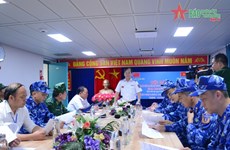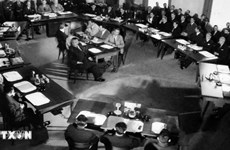Vietnam, Thailand issue Joint Statement
Vietnam and Thailand have issued a Joint Statement on the
occasion of the official visit to Thailand of the General Secretary
of the Communist Party of Vietnam Nguyen Phu Trong.
Vietnam and Thailand have issued a Joint Statement on the
occasion of the official visit to Thailand of the General Secretary
of the Communist Party of Vietnam Nguyen Phu Trong.
The following is the full text of the Joint Statement.
“1. At the invitation of the Prime Minister of Thailand, H.E. Ms. Yingluck Shinawatra, the General Secretary of the Central Committee of the Communist Party of Vietnam, H.E. Mr. Nguyen Phu Trong paid an official visit to the Kingdom of Thailand on 25 - 27 June 2013.
During his stay in Thailand, H.E. Mr. Nguyen Phu Trong had a bilateral meeting with H.E. Ms. Yingluck Shinawatra; held discussions with the President of the National Assembly and Speaker of the House of Representatives, H.E. Mr. Somsak Kiatsuranont; President of the Senate, H.E. Mr. Nikom Wairatpanij; leaders of Thai political parties; the Thai private sector; and the Thailand - Vietnam Friendship Association; was conferred an honorary doctorate from Thammasat University; met Vietnamese community in Thailand and visited several economic and cultural facilities in Bangkok and Nakhon Phanom Province.
2. During their talks which were held in an atmosphere of sincerity and trust, H.E. Ms. Yingluck Shinawatra applauded Vietnam ’s achievements towards industrialisation and modernisation, and congratulated Vietnam on her increasing role in the international arena. H.E. Mr. Nguyen Phu Trong commended Thailand on her socio-economic achievements and expressed support for Thailand ’s plans towards achieving a comprehensive development and active roles in the region and the world at large.
3. The two leaders exchanged views on the current status and prospect of the Thailand - Vietnam relations in all areas, including in the political, defence, security, economic, trade and investment fields, and committed to expanding cooperation in all fields in order to strengthen ties and friendship between the two countries, and promote peace, stability and development in the region as a whole.
4. The two leaders agreed to enhance closer interaction and cooperation between the political parties of Thailand and Vietnam, including exchanges of information and sharing of leadership and governance experiences; foster political dialogues at various levels, especially at the highest level; and promote people-to-people contacts, including exchanges of youths and the younger generations of the two countries.
5. Motivated by the continuing development of the Thailand - Vietnam friendship and cooperation since diplomatic relations were established in 1976, and noting the historic significance of this visit, the two leaders decided to elevate their bilateral relations to a Strategic Partnership with a view to opening up new prospects for closer cooperation for the benefits of peoples of the two countries, and for peace, stability and development in the region, as well as contributing to the building of a united and strong ASEAN Community.
To this end, and on the basis of existing cooperation agreements, frameworks, and mechanisms, the two leaders agreed to forge the Strategic Partnership in the following areas:
On political cooperation: to enhance mutual trust and understanding through exchanges of high-level visits and strategic political dialogues; and to maintain sound political ties as a solid foundation for the development and strengthening of cooperation in other areas.
On defence and security cooperation: to strengthen, expand and improve the efficiency of defence and security cooperation; to increase cooperation on dealing with traditional and non-traditional security challenges; to promote consular cooperation; and to reaffirm their committment not to allowing any individual or organisation to use their own national territory to conduct activities against the other.
On economic cooperation: to promote cooperation in trade, investment, agriculture, energy, telecommunications, information technology and transport; to strive to increase the annual two-way trade volume to US$15 billion by 2020; and to strengthen transport connectivity between the two countries and with other countries in the region via existing land transport networks and economic corridors, particularly the East-West Economic Corridor, Route 8 and Route 12.
On social, cultural, people-to-people cooperation, and other areas of mutual interest: to establish Thai and Vietnamese Studies Centres at certain universities in each country; to enhance cooperation in labour issues; to further improve the role of friendship organisations, such as the Thai community in Vietnam and the Vietnamse community in Thailand while promoting local-level cooperation; and to strengthen people-to-people exchanges through the Thailand - Vietnam and Vietnam - Thailand Friendship Associations.
On regional and international cooperation : to increase joint efforts to build an ASEAN Community that is politically cohesive, economically integrated, and socially responsible, while promoting the Association’s centrality in the regional architecture, for peace, cooperation and development in the region; to work closely together at regional fora and enhance regional and sub-regional economic development, including the Mekong Forum with development partners to narrow the development gap within Southeast Asia; and to support each other’s candidatures to the United Nations bodies, regional and international organisations.
To implement the Strategic Partnership, the two leaders agreed to assign the two Foreign Ministries to coodinate with relevant Ministries/agencies to formulate Plans of Action in the above-mentioned areas to be discussed at the inaugural Joint Commission on Bilateral Cooperation to be co-chaired by the Foreign Ministers of both sides.
6. The two leaders committed to further deepening their countries’ cooperation to build a united, cohesive and strong ASEAN Community, and strengthen ASEAN frameworks such as ASEAN, ASEAN+1, ASEAN+3, ASEAN Regional Forum, and the ASEAN Defence Ministerial Meeting. They also agreed to promote consultation and cooperation at sub-regional, regional and international fora such as the ACMECS, the Greater Mekong Sub-region, the East Asia Summit, UN, WTO, APEC, ASE M, etc., in an effort to preserve and promote peace, stability, cooperation, development and prosperity of the region and the world as a whole.
7. The two leaders agreed on the need to closely coordinate in maintaining peace and stability in the South China Sea (the East Sea called by Vietnam); enhancing mutual trust and confidence through maritime cooperation; promoting maritime security including freedom of navigation and over-flight; exercising self-restraint and refraining from the use of force; resolving disputes by peaceful means on the basis of international laws, including the 1982 UNCLOS and the DOC; and working towards early adoption of the COC.
8. The two leaders noted the need to enhance cooperation in implementing measures to protect transnational water resources for sustainable development; and conduct of comprehensive research on sustainable use of Mekong river water resources.
9. H.E. Mr. Nguyen Phu Trong expressed his heartfelt gratitude to H.E. Ms. Yingluck Shinawatra, the Royal Government and the people of Thailand for their warm reception, hospitality and friendship. H.E. Mr. Nguyen Phu Trong kindly extended an invitation to H.E. Ms. Yingluck Shinawatra to visit Vietnam again at a mutually convenient date, which H.E. Ms. Yingluck Shinawatra accepted with thanks and pleasure. The specific time of the visit shall be arranged through the diplomatic channel”.-VNA
The following is the full text of the Joint Statement.
“1. At the invitation of the Prime Minister of Thailand, H.E. Ms. Yingluck Shinawatra, the General Secretary of the Central Committee of the Communist Party of Vietnam, H.E. Mr. Nguyen Phu Trong paid an official visit to the Kingdom of Thailand on 25 - 27 June 2013.
During his stay in Thailand, H.E. Mr. Nguyen Phu Trong had a bilateral meeting with H.E. Ms. Yingluck Shinawatra; held discussions with the President of the National Assembly and Speaker of the House of Representatives, H.E. Mr. Somsak Kiatsuranont; President of the Senate, H.E. Mr. Nikom Wairatpanij; leaders of Thai political parties; the Thai private sector; and the Thailand - Vietnam Friendship Association; was conferred an honorary doctorate from Thammasat University; met Vietnamese community in Thailand and visited several economic and cultural facilities in Bangkok and Nakhon Phanom Province.
2. During their talks which were held in an atmosphere of sincerity and trust, H.E. Ms. Yingluck Shinawatra applauded Vietnam ’s achievements towards industrialisation and modernisation, and congratulated Vietnam on her increasing role in the international arena. H.E. Mr. Nguyen Phu Trong commended Thailand on her socio-economic achievements and expressed support for Thailand ’s plans towards achieving a comprehensive development and active roles in the region and the world at large.
3. The two leaders exchanged views on the current status and prospect of the Thailand - Vietnam relations in all areas, including in the political, defence, security, economic, trade and investment fields, and committed to expanding cooperation in all fields in order to strengthen ties and friendship between the two countries, and promote peace, stability and development in the region as a whole.
4. The two leaders agreed to enhance closer interaction and cooperation between the political parties of Thailand and Vietnam, including exchanges of information and sharing of leadership and governance experiences; foster political dialogues at various levels, especially at the highest level; and promote people-to-people contacts, including exchanges of youths and the younger generations of the two countries.
5. Motivated by the continuing development of the Thailand - Vietnam friendship and cooperation since diplomatic relations were established in 1976, and noting the historic significance of this visit, the two leaders decided to elevate their bilateral relations to a Strategic Partnership with a view to opening up new prospects for closer cooperation for the benefits of peoples of the two countries, and for peace, stability and development in the region, as well as contributing to the building of a united and strong ASEAN Community.
To this end, and on the basis of existing cooperation agreements, frameworks, and mechanisms, the two leaders agreed to forge the Strategic Partnership in the following areas:
On political cooperation: to enhance mutual trust and understanding through exchanges of high-level visits and strategic political dialogues; and to maintain sound political ties as a solid foundation for the development and strengthening of cooperation in other areas.
On defence and security cooperation: to strengthen, expand and improve the efficiency of defence and security cooperation; to increase cooperation on dealing with traditional and non-traditional security challenges; to promote consular cooperation; and to reaffirm their committment not to allowing any individual or organisation to use their own national territory to conduct activities against the other.
On economic cooperation: to promote cooperation in trade, investment, agriculture, energy, telecommunications, information technology and transport; to strive to increase the annual two-way trade volume to US$15 billion by 2020; and to strengthen transport connectivity between the two countries and with other countries in the region via existing land transport networks and economic corridors, particularly the East-West Economic Corridor, Route 8 and Route 12.
On social, cultural, people-to-people cooperation, and other areas of mutual interest: to establish Thai and Vietnamese Studies Centres at certain universities in each country; to enhance cooperation in labour issues; to further improve the role of friendship organisations, such as the Thai community in Vietnam and the Vietnamse community in Thailand while promoting local-level cooperation; and to strengthen people-to-people exchanges through the Thailand - Vietnam and Vietnam - Thailand Friendship Associations.
On regional and international cooperation : to increase joint efforts to build an ASEAN Community that is politically cohesive, economically integrated, and socially responsible, while promoting the Association’s centrality in the regional architecture, for peace, cooperation and development in the region; to work closely together at regional fora and enhance regional and sub-regional economic development, including the Mekong Forum with development partners to narrow the development gap within Southeast Asia; and to support each other’s candidatures to the United Nations bodies, regional and international organisations.
To implement the Strategic Partnership, the two leaders agreed to assign the two Foreign Ministries to coodinate with relevant Ministries/agencies to formulate Plans of Action in the above-mentioned areas to be discussed at the inaugural Joint Commission on Bilateral Cooperation to be co-chaired by the Foreign Ministers of both sides.
6. The two leaders committed to further deepening their countries’ cooperation to build a united, cohesive and strong ASEAN Community, and strengthen ASEAN frameworks such as ASEAN, ASEAN+1, ASEAN+3, ASEAN Regional Forum, and the ASEAN Defence Ministerial Meeting. They also agreed to promote consultation and cooperation at sub-regional, regional and international fora such as the ACMECS, the Greater Mekong Sub-region, the East Asia Summit, UN, WTO, APEC, ASE M, etc., in an effort to preserve and promote peace, stability, cooperation, development and prosperity of the region and the world as a whole.
7. The two leaders agreed on the need to closely coordinate in maintaining peace and stability in the South China Sea (the East Sea called by Vietnam); enhancing mutual trust and confidence through maritime cooperation; promoting maritime security including freedom of navigation and over-flight; exercising self-restraint and refraining from the use of force; resolving disputes by peaceful means on the basis of international laws, including the 1982 UNCLOS and the DOC; and working towards early adoption of the COC.
8. The two leaders noted the need to enhance cooperation in implementing measures to protect transnational water resources for sustainable development; and conduct of comprehensive research on sustainable use of Mekong river water resources.
9. H.E. Mr. Nguyen Phu Trong expressed his heartfelt gratitude to H.E. Ms. Yingluck Shinawatra, the Royal Government and the people of Thailand for their warm reception, hospitality and friendship. H.E. Mr. Nguyen Phu Trong kindly extended an invitation to H.E. Ms. Yingluck Shinawatra to visit Vietnam again at a mutually convenient date, which H.E. Ms. Yingluck Shinawatra accepted with thanks and pleasure. The specific time of the visit shall be arranged through the diplomatic channel”.-VNA













